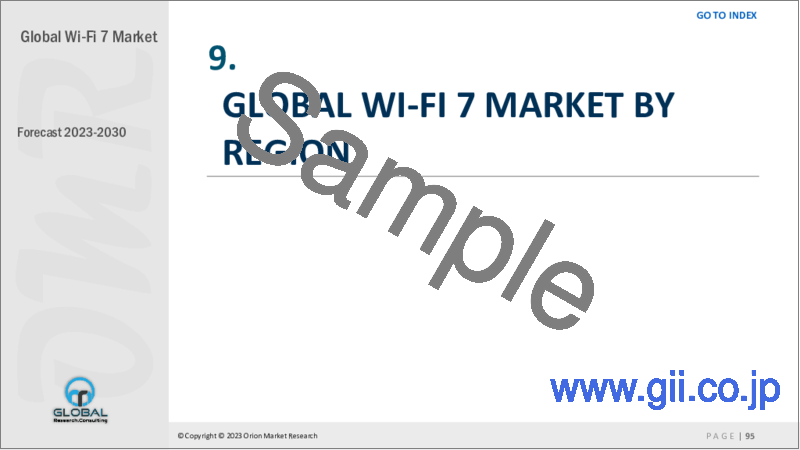|
|
市場調査レポート
商品コード
1363950
Wi-Fi 7の世界市場:2023-2030年Global Wi-Fi 7 Market 2023-2030 |
||||||
カスタマイズ可能
|
|||||||
| Wi-Fi 7の世界市場:2023-2030年 |
|
出版日: 2023年09月22日
発行: Orion Market Research
ページ情報: 英文 180 Pages
納期: 2~3営業日
|
- 全表示
- 概要
- 図表
- 目次
世界のWi-Fi 7市場は、予測期間中に52%のCAGRで成長すると予測されています。Wi-Fi 7は、IEEE 802.11be Extremely High Throughput(EHT)としても知られる、今後のWi-Fi規格です。2.4GHz、5GHz、6GHzの3つの帯域で動作し、周波数リソースをフルに活用できます。Wi-Fi 7の目標は、あらゆるデバイスに驚異的な速度をより高い効率で提供することです。320 MHzの超広帯域幅、4,096-QAM、マルチRU、マルチリンクオペレーションを導入し、Wi-Fi 6の4.8倍、Wi-Fi 5の13倍の速度を提供します。
強化されたネットワーク、低遅延、帯域幅の通信に対する需要が企業間で高まっていることが、市場を牽引すると推定されます。さらに、データトラフィックの大幅な増加により、企業や産業など複数の業種にわたって、いつでもどこでもリアルタイムで高速なアップデートを入手できる優れたネットワーク接続のニーズが加速しています。Wi-Fi 7は、例えばサーモスタット、照明、防犯カメラなどのスマート家電をつなぐことができます。また、ロボットやセンサーなどの産業用IoTガジェットとの連携も可能です。こうした新しいプログラムがWi-Fi 7への関心を高め、市場を拡大しています。しかし、商業上の最大の制約の1つは、Wi-Fi 7デバイスのコストが高いことです。Wi-Fi 7デバイスは複雑なため、旧世代のWi-Fiデバイスよりも導入が難しいです。その結果、設置者はサービスにより多くの費用を支払うことになります。
セグメント別の展望
医療・ライフサイエンス・セグメントがWi-Fi 7市場で大きなシェアを占める見込み
Wi-Fi 7やその他のワイヤレス技術は、さまざまな形で医療産業を支援し貢献しています。Wi-Fi 7は医療機器をインターネットに接続するのに役立ち、医療従事者が患者を監督できるようにします。これにより、患者のケアを向上させ、コストを削減することができます。Wi-Fi 7は遠隔医療サービスを提供し、患者が医療提供者と遠隔で相談できるようにします。米国病院協会によると、テレヘルスは、ビデオ会議、遠隔モニタリング、電子コンサルティング、ワイヤレス通信を通じて、患者を重要な医療サービスにつなげます。医師や専門家へのアクセスを増やすことで、遠隔医療は患者が適切な場所で適切な時間に適切な治療を受けられるようにします。現在、米国の病院の76%は、ビデオやその他の技術を使って、離れた場所にいる患者や専門家とつながっています。
Wi-Fi 7は手術ロボットの制御にも役立ち、外科医がより精密で正確な手術を行うのに役立っています。米国国立衛生研究所の研究によると、手術ロボットを使用することで、手術における合併症のリスクを軽減できることがわかっています。この研究では、ロボット支援腹腔鏡手技は小児外科手術において技術的に実現可能であり、正期産児や早産児のさまざまな障害の治療に役立つ可能性があると結論づけています。2022年5月、JAMA誌に発表されたこの研究は、The Urology FoundationがChampniss Foundationからの助成金を受けて実施したもので、ロボット手術によって再入院の可能性が半分(52%)に減少したこと、また、開腹手術を受けた患者と比較して、健康状態の悪化や罹患の重大な原因である血栓(深部静脈血栓および肺塞栓)の有病率が「顕著な」4倍(77%)減少したことも明らかにしました。
地域別展望
世界のWi-Fi 7市場は、北米(米国、カナダ)、欧州(イタリア、スペイン、ドイツ、フランス、その他)、アジア太平洋(インド、中国、日本、韓国、その他)、その他の地域(中東・アフリカ、南米)を含む地域別にさらに細分化されています。北米はWi-Fi技術の主要市場になると予想されています。同地域はスマートフォンユーザーの人口が増加傾向にあり、家庭や企業における高速インターネット接続の需要が高いです。
アジア太平洋はWi-Fi 7市場で最大の地域になる見込み
アジアにおける無線技術の進歩と普及は驚異的としか言いようがありません。わずか数十年の間に、アジアは世界のワイヤレス先進国から技術革新と普及のリーダーへと急成長しました。この急速な発展は、多くの要因に支えられています。その一つは、アジア市場の大きさです。さらに、アジアには世界の人口の半分にあたる45億人以上が住んでいます。このことは、ワイヤレス・サービスの潜在的な市場規模を拡大し、価格を押し下げ、すべての消費者がワイヤレス技術をより広く利用できるようにするのに役立っています。所得が増えれば、携帯電話サービスのような贅沢品に使えるお金も増えます。所得の増加に伴い、人々は携帯電話サービスのような贅沢品に費やすお金が増えます。このため、ワイヤレス商品やサービスに対する需要は劇的に増加し、この分野への新しいアイデアや金融投資が活発化しています。さらに、アジア政府はワイヤレス・ビジネスの発展に大きく貢献しています。
目次
第1章 レポート概要
- 業界の現状分析と成長可能性の展望
- 調査方法とツール
- 市場内訳
- セグメント別
- 地域別
第2章 市場概要と洞察
- 調査範囲
- アナリストの洞察と現在の市場動向
- 主な調査結果
- 推奨事項
- 結論
第3章 競合情勢
- 主要企業分析
- Edgewater Wireless
- 概要
- 財務分析
- SWOT分析
- 最近の動向
- Huawei Device Co., Ltd.
- 概要
- 財務分析
- SWOT分析
- 最近の動向
- MaxLinear Inc.
- 概要
- 財務分析
- SWOT分析
- 最近の動向
- Qualcomm Technologies, Inc.
- 概要
- 財務分析
- SWOT分析
- 最近の動向
- TP-Link Corp. Ltd.
- 概要
- 財務分析
- SWOT分析
- 最近の動向
- 主要戦略分析
第4章 市場セグメンテーション
- 世界のWi-Fi 7市場:ロケーションタイプ別
- 屋内
- 屋外
- 世界のWi-Fi 7市場:用途別
- ソーシャルクラウドベースゲーム
- IoT・産業
- 8K動画ストリーミング・ビデオ会議
- 遠隔医療
- その他の用途
- 世界のWi-Fi 7市場:製品別
- ハードウェア
- ソリューション・サービス
- 世界のWi-Fi 7市場:業種別
- 教育
- メディア・エンターテインメント
- 小売
- 住宅
- 医療・ライフサイエンス
- その他の業種(銀行、金融サービス、保険)
第5章 地域分析
- 北米
- 米国
- カナダ
- 欧州
- 英国
- ドイツ
- イタリア
- スペイン
- フランス
- その他欧州
- アジア太平洋
- 中国
- インド
- 日本
- 韓国
- その他アジア太平洋
- 世界のその他の地域
第6章 企業プロファイル
- Actiontec Electronics, Inc.
- ADB Global
- Broadcom
- CommScope, Inc.
- HFCL Ltd.
- Intel Corp.
- Keysight Technologies
- LitePoint
- MediaTek Inc.
- NETGEAR Inc.
- New H3C Technologies Co., Ltd.
- Rohde & Schwarz USA, Inc.
- Ruijie Networks Co., Ltd.
- SDMC Location type Co., Ltd.
- Senscomm Semiconductor Co., LTD.
- Vantiva
- VVDN Technologies
- ZTE Corp.
LIST OF TABLES
- 1. GLOBAL WI-FI 7 MARKET RESEARCH AND ANALYSIS BY LOCATION TYPE, 2022-2030 ($ MILLION)
- 2. GLOBAL INDOOR WI-FI 7 MARKET RESEARCH AND ANALYSIS BY REGION,2022-2030 ($ MILLION)
- 3. GLOBAL OUTDOOR WI-FI 7 MARKET RESEARCH AND ANALYSIS BY REGION, 2022-2030 ($ MILLION)
- 4. GLOBAL WI-FI 7 MARKET RESEARCH AND ANALYSIS BY APPLICATION, 2022-2030 ($ MILLION)
- 5. GLOBAL WI-FI 7 for SOCIAL CLOUD-BASED GAMING MARKET RESEARCH AND ANALYSIS BY REGION, 2022-2030 ($ MILLION)
- 6. GLOBAL IOT AND INDUSTRY WI-FI 7 MARKET RESEARCH AND ANALYSIS BY REGION, 2022-2030 ($ MILLION)
- 7. GLOBAL 8K VIDEO STREAMING & VIDEO CONFERENCING WI-FI 7 MARKET RESEARCH AND ANALYSIS BY REGION, 2022-2030 ($ MILLION)
- 8. GLOBAL TELEMEDICINE WI-FI 7 MARKET RESEARCH AND ANALYSIS BY REGION, 2022-2030 ($ MILLION)
- 9. GLOBAL OTHER APPLICATIONS WI-FI 7 MARKET RESEARCH AND ANALYSIS BY REGION, 2022-2030 ($ MILLION)
- 10. GLOBAL WI-FI 7 MARKET RESEARCH AND ANALYSIS BY OFFERING, 2022-2030 ($ MILLION)
- 11. GLOBAL HARDWARE WI-FI 7 MARKET RESEARCH AND ANALYSIS BY REGION, 2022-2030 ($ MILLION)
- 12. GLOBAL SOLUTIONS WI-FI 7 MARKET RESEARCH AND ANALYSIS BY REGION, 2022-2030 ($ MILLION)
- 13. GLOBAL SERVICES WI-FI 7 MARKET RESEARCH AND ANALYSIS BY REGION, 2022-2030 ($ MILLION)
- 14. GLOBAL WI-FI 7 MARKET RESEARCH AND ANALYSIS BY VERTICAL, 2022-2030 ($ MILLION)
- 15. GLOBAL EDUCATION WI-FI 7 MARKET RESEARCH AND ANALYSIS BY REGION, 2022-2030 ($ MILLION)
- 16. GLOBAL MEDIA AND ENTERTAINMENT WI-FI 7 MARKET RESEARCH AND ANALYSIS BY REGION, 2022-2030 ($ MILLION)
- 17. GLOBAL HEALTHCARE & LIFE SCIENCES WI-FI 7 MARKET RESEARCH AND ANALYSIS BY REGION, 2022-2030 ($ MILLION)
- 18. GLOBAL RETAIL WI-FI 7 MARKET RESEARCH AND ANALYSIS BY REGION, 2022-2030 ($ MILLION)
- 19. GLOBAL OTHER VERTICALS WI-FI 7 MARKET RESEARCH AND ANALYSIS BY REGION, 2022-2030 ($ MILLION)
- 20. GLOBAL WI-FI 7 MARKET RESEARCH AND ANALYSIS BY REGION, 2022-2030 ($ MILLION)
- 21. NORTH AMERICAN WI-FI 7 MARKET RESEARCH AND ANALYSIS BY COUNTRY, 2022-2030 ($ MILLION)
- 22. NORTH AMERICAN WI-FI 7 MARKET RESEARCH AND ANALYSIS BY LOCATION TYPE, 2022-2030 ($ MILLION)
- 23. NORTH AMERICAN WI-FI 7 MARKET RESEARCH AND ANALYSIS BY APPLICATION, 2022-2030 ($ MILLION)
- 24. NORTH AMERICAN WI-FI 7 MARKET RESEARCH AND ANALYSIS BY OFFERING, 2022-2030 ($ MILLION)
- 25. NORTH AMERICAN WI-FI 7 MARKET RESEARCH AND ANALYSIS BY VERTICAL, 2022-2030 ($ MILLION)
- 26. EUROPEAN WI-FI 7 MARKET RESEARCH AND ANALYSIS BY COUNTRY, 2022-2030 ($ MILLION)
- 27. EUROPEAN WI-FI 7 MARKET RESEARCH AND ANALYSIS BY LOCATION TYPE, 2022-2030 ($ MILLION)
- 28. EUROPEAN WI-FI 7 MARKET RESEARCH AND ANALYSIS BY APPLICATION, 2022-2030 ($ MILLION)
- 29. EUROPEAN WI-FI 7 MARKET RESEARCH AND ANALYSIS BY OFFERING, 2022-2030 ($ MILLION)
- 30. EUROPEAN WI-FI 7 MARKET RESEARCH AND ANALYSIS BY VERTICAL, 2022-2030 ($ MILLION)
- 31. ASIA- PACIFIC WI-FI 7 MARKET RESEARCH AND ANALYSIS BY COUNTRY, 2022-2030 ($ MILLION)
- 32. ASIA- PACIFIC WI-FI 7 MARKET RESEARCH AND ANALYSIS BY LOCATION TYPE, 2022-2030 ($ MILLION)
- 33. ASIA-PACIFIC WI-FI 7 MARKET RESEARCH AND ANALYSIS BY APPLICATION, 2022-2030 ($ MILLION)
34. ASIA-PACIFIC WI-FI 7 MARKET RESEARCH AND ANALYSIS BY OFFERING, 2022-2030 ($ MILLION
35. ASIA-PACIFIC WI-FI 7 MARKET RESEARCH AND ANALYSIS BY VERTICAL, 2022-2030 ($ MILLION
- 36. REST OF THE WORLD WI-FI 7 MARKET RESEARCH AND ANALYSIS BY COUNTRY, 2022-2030 ($ MILLION)
- 37. REST OF THE WORLD WI-FI 7 MARKET RESEARCH AND ANALYSIS BY LOCATION TYPE, 2022-2030 ($ MILLION)
- 38. REST OF THE WORLD WI-FI 7 MARKET RESEARCH AND ANALYSIS BY APPLICATION, 2022-2030 ($ MILLION)
- 39. REST OF THE WORLD WI-FI 7 MARKET RESEARCH AND ANALYSIS BY OFFERING, 2022-2030 ($ MILLION)
- 40. REST OF THE WORLD WI-FI 7 MARKET RESEARCH AND ANALYSIS BY VERTICAL, 2022-2030 ($ MILLION)
LIST OF FIGURES
- 1. GLOBAL WI-FI 7 MARKET SHARE BY LOCATION TYPE, 2022 VS 2030 (%)
- 2. GLOBAL INDOOR WI-FI 7 MARKET SHARE BY REGION, 2022 VS 2030 (%)
- 3. GLOBAL OUTDOOR WI-FI 7 MARKET SHARE BY REGION BY REGION, 2022 VS 2030 (%)
- 4. GLOBAL WI-FI 7 MARKET SHARE BY APPLICATION, 2022 VS 2030 ($ MILLION)
- 5. GLOBAL WI-FI 7 FOR SOCIAL CLOUD-BASED GAMING MARKET SHARE BY REGION, 2022 VS 2030 (%)
- 6. GLOBAL IOT AND INDUSTRY WI-FI 7 MARKET SHARE BY REGION, 2022 VS 2030 (%)
- 7. GLOBAL 8K VIDEO STREAMING & VIDEO CONFERENCING WI-FI 7 MARKET SHARE BY REGION, 2022 VS 2030 (%)
- 8. GLOBAL TELEMEDICINE WI-FI 7 MARKET SHARE BY REGION, 2022 VS 2030 (%)
- 9. GLOBAL OTHER APPLICATIONS WI-FI 7 MARKET SHARE BY REGION, 2022 VS 2030 (%)
- 10. GLOBAL WI-FI 7 MARKET SHARE BY OFFERING, 2022 VS 2030 ($ MILLION)
- 11. GLOBAL HARDWARE WI-FI 7 MARKET SHARE BY REGION, 2022 VS 2030 (%)
- 12. GLOBAL SOLUTIONS WI-FI 7 MARKET SHARE BY REGION, 2022 VS 2030 (%)
- 13. GLOBAL SERVICES WI-FI 7 MARKET SHARE BY REGION, 2022 VS 2030 (%)
- 14. GLOBAL WI-FI 7 MARKET SHARE BY VERTICAL, 2022 VS 2030 ($ MILLION)
- 15. GLOBAL EDUCATION WI-FI 7 MARKET SHARE BY REGION, 2022 VS 2030 (%)
- 16. GLOBAL MEDIA & ENTERTAINMENT WI-FI 7 MARKET SHARE BY REGION, 2022 VS 2030 (%)
- 17. GLOBAL HEALTHCARE & LIFE SCIENCES WI-FI 7 MARKET SHARE BY REGION, 2022 VS 2030 (%)
- 18. GLOBAL RETAIL WI-FI 7 MARKET SHARE BY REGION, 2022 VS 2030 (%)
- 19. GLOBAL OTHER VERTICAL WI-FI 7 MARKET SHARE BY REGION, 2022 VS 2030 (%)
- 20. GLOBAL WI-FI 7 MARKET SHARE BY REGION, 2022 VS 2030 (%)
- 21. US WI-FI 7 MARKET SIZE, 2022-2030 ($ MILLION)
- 22. CANADA WI-FI 7 MARKET SIZE, 2022-2030 ($ MILLION)
- 23. UK WI-FI 7 MARKET SIZE, 2022-2030 ($ MILLION)
- 24. FRANCE WI-FI 7 MARKET SIZE, 2022-2030 ($ MILLION)
- 25. GERMANY WI-FI 7 MARKET SIZE, 2022-2030 ($ MILLION)
- 26. ITALY WI-FI 7 MARKET SIZE, 2022-2030 ($ MILLION)
- 27. SPAIN WI-FI 7 MARKET SIZE, 2022-2030 ($ MILLION)
- 28. REST OF EUROPE WI-FI 7 MARKET SIZE, 2022-2030 ($ MILLION)
- 29. INDIA WI-FI 7 MARKET SIZE, 2022-2030 ($ MILLION)
- 30. CHINA WI-FI 7 MARKET SIZE, 2022-2030 ($ MILLION)
- 31. JAPAN WI-FI 7 MARKET SIZE, 2022-2030 ($ MILLION)
- 32. SOUTH KOREA WI-FI 7 MARKET SIZE, 2022-2030 ($ MILLION)
- 33. REST OF ASIA-PACIFIC WI-FI 7 MARKET SIZE, 2022-2030 ($ MILLION)
- 34. REST OF THE WORLD WI-FI 7 MARKET SIZE, 2022-2030 ($ MILLION)
Title: Global Wi-Fi 7 Market Size, Share & Trends Analysis Report Market by Location Type (Indoor, and Outdoor), by Application (Social Cloud-Based Gaming, IoT and Industry, 8K Video Streaming & Video Conferencing, Telemedicine, and Other Applications), by Offering (Hardware, and Solutions & Services), and by Vertical (Education, Media and Entertainment, Retail, Residential, Healthcare & Life Sciences, and Other Verticals)Forecast Period (2023-2030).
The global Wi-Fi 7 market is anticipated to grow at a considerable CAGR of 52% during the forecast period. Wi-Fi 7 is the upcoming Wi-Fi standard, also known as IEEE 802.11be Extremely High Throughput (EHT). It works across all three bands such as 2.4 GHz, 5 GHz, and 6 GHz; which allows to fully utilize spectrum resources. Wi-Fi 7's goal is to deliver extraordinary speeds for every device with greater efficiency. It introduces 320 MHz ultra-wide bandwidth, 4,096-QAM, Multi-RU, and Multi-Link Operation to provide speed of 4.8 times faster than Wi-Fi 6 and 13 times faster than Wi-Fi 5.
The growing demand for an enhanced network, low latency, and bandwidth communications across enterprises is estimated to drive the market. Additionally, the significant increase in data traffic has accelerated the need for superior network connectivity across several verticals, such as corporate and industrial to get real-time and fast updates at anytime and anywhere. Wi-Fi 7 can link up smart home appliances like thermostats, lights, and security cameras, for instance. It is also capable of linking industrial IoT gadgets such as robots and sensors. These new programs are boosting interest in Wi-Fi 7 and expanding the market. However, one of the biggest commercial constraints is the high cost of Wi-Fi 7 devices. The complexity of Wi-Fi 7 devices makes them more challenging to deploy than Wi-Fi devices from earlier generations. Installers can end up paying more for services as a result.
Segmental Outlook
The global Wi-Fi 7 market is segmented by location Type, application, offering, and vertical. By location type, the market is segmented into indoor and outdoor. By application, the market is sub-segmented into social cloud-based gaming, IoT and industry, 8K video streaming & video conferencing, telemedicines, and other Applications. By offering, the market is segmented into hardware, solutions, and services. By vertical, the market is further segmented into education, media and entertainment, retail, residential, healthcare and life sciences, and other verticals. Wi-Fi 7 holds immense potential for transforming the media and entertainment industries, enhancing speed, range, and reliability. It enables seamless streaming of high-quality content, including 4K and 8K videos, without buffering or lag, enabling real-time delivery of premium content to consumers.
The Healthcare and Life Sciences Segment is Expected to Hold a Considerable Share of Wi-Fi 7 Market
Wi-Fi 7 and other wireless technologies are assisting and contributing to the healthcare industry in a variety of ways. Wi-Fi 7 helps to connect medical devices to the internet, allowing healthcare providers to supervise patients. This can help to improve patient care and reduce costs. Wi-Fi 7 can provide telehealth services, allowing patients to consult with healthcare providers remotely. According to the American Hospital Association, Telehealth connects patients to vital healthcare services through videoconferencing, remote monitoring, electronic consults, and wireless communications. By increasing access to physicians and specialists, telehealth helps ensure patients receive the right care, at the right place, at the right time. Currently, 76 percent of U.S. hospitals connect with patients and consulting practitioners at a distance through the use of video and other technology.
Wi-Fi 7 helps to control surgical robots, which can help surgeons to perform more precise and accurate surgeries. A study by the National Institutes of Health found that using surgical robots can help reduce the risk of complications in surgery. The study concludes that robotic-assisted laparoscopic techniques are technically feasible in pediatric surgery and may be of benefit in treating various disorders in term and preterm infants. In May 2022, the study, published in JAMA and funded by The Urology Foundation with a grant from the Champniss Foundation, also found robotic surgery reduced the chance of readmission by half (52 per cent), and revealed a "striking" four-fold (77 per cent) reduction in prevalence of blood clots (deep vein thrombus & pulmonary emboli) - a significant cause of health decline and morbidity - when compared to patients who had open surgery.
Regional Outlook
The global Wi-Fi 7 market is further segmented based on geography, including North America (the US and Canada), Europe (Italy, Spain, Germany, France, and others), Asia-Pacific (India, China, Japan, South Korea, and others), and the Rest of the World (the Middle East & Africa and Latin America). North America is anticipated to be a major market for Wi-Fi technology. The region has a large and growing population of smartphone users, and there is a high demand for high-speed internet connectivity in homes and businesses.
Asia-Pacific is Expected to be the Largest Region in the Wi-Fi 7 market
The advancement and adoption of wireless technology have been nothing short of astounding in Asia. In only a few short decades, Asia has quickly gone from being the world's wireless addition to the innovation and adoption leader. This rapid development has been assisted by a number of factors. One aspect is the size of the Asian market. Additionally, Asia is home to more than 4.5 billion people or half of the world's population. This expands the size of the potential market for wireless services, helps to drive down prices, and makes wireless technology more widely available to all consumers. With rising incomes, people have more money to spend on luxuries like cellular services. With rising incomes, people have more money to spend on luxuries like cellular services. Due to this, demand for wireless goods and services has increased dramatically, which has sparked new ideas and financial investment in the sector. Furthermore, the Asian government has made a substantial contribution to the development of the wireless business.
Market Players Outlook
The major companies serving the global Wi-Fi 7 market include Qualcomm Technologies, TP-Link Corp. Ltd., MaxLinear Inc., Huawei Device Co., Ltd., and Edgewater Wireless among others. The market players are considerably contributing to the market growth by the adoption of various strategies, including mergers and acquisitions, partnerships, collaborations, and new product launches, to stay competitive in the market.
The Report Covers:
- Market value data analysis of 2022 and forecast to 2030.
- Annualized market revenues ($ million) for each market segment.
- Country-wise analysis of major geographical regions.
- Key companies operating in the global Wi-Fi 7 market. Based on the availability of data, information related to new product launches, and relevant news is also available in the report.
- Analysis of business strategies by identifying the key market segments positioned for strong growth in the future.
- Analysis of market-entry and market expansion strategies.
- Competitive strategies by identifying 'who-stands-where' in the market.
Table of Contents
1. Report Summary
- Current Industry Analysis and Growth Potential Outlook
- 1.1. Research Methods and Tools
- 1.2. Market Breakdown
- 1.2.1. By Segments
- 1.2.2. By Region
2. Market Overview and Insights
- 2.1. Scope of the Report
- 2.2. Analyst Insight & Current Market Trends
- 2.2.1. Key Findings
- 2.2.2. Recommendations
- 2.2.3. Conclusion
3. Competitive Landscape
- 3.1. Key Company Analysis
- 3.2. Edgewater Wireless
- 3.2.1. Overview
- 3.2.2. Financial Analysis
- 3.2.3. SWOT Analysis
- 3.2.4. Recent Developments
- 3.3. Huawei Device Co., Ltd.
- 3.3.1. Overview
- 3.3.2. Financial Analysis
- 3.3.3. SWOT Analysis
- 3.3.4. Recent Developments
- 3.4. MaxLinear Inc.
- 3.4.1. Overview
- 3.4.2. Financial Analysis
- 3.4.3. SWOT Analysis
- 3.4.4. Recent Developments
- 3.5. Qualcomm Technologies, Inc.
- 3.4.5. Overview
- 3.4.6. Financial Analysis
- 3.4.7. SWOT Analysis
- 3.4.8. Recent Developments
- 3.5. TP-Link Corp. Ltd.
- 3.5.1. Overview
- 3.5.2. Financial Analysis
- 3.5.3. SWOT Analysis
- 3.5.4. Recent Developments
- 3.6. Key Strategy Analysis
4. Market Segmentation
- 4.1. Global Wi-Fi 7 Market by Location Type
- 4.1.1. Indoor
- 4.1.2. Outdoor
- 4.2. Global Wi-Fi 7 Market by Application
- 4.2.1. Social Cloud-Based Gaming
- 4.2.2. IoT and Industry
- 4.2.3. 8K Video Streaming & Video Conferencing
- 4.2.4. Telemedicine
- 4.2.5. Other Applications
- 4.3. Global Wi-Fi 7 Market by Offering
- 4.3.1. Hardware
- 4.3.2. Solutions & Services
- 4.4. Global Wi-Fi 7 Market by Vertical
- 4.4.1. Education
- 4.4.2. Media and Entertainment
- 4.4.3. Retail
- 4.4.4. Residential
- 4.4.5. Healthcare & Life Sciences
- 4.4.6. Other Verticals(Banking, Financial Services, and Insurance)
5. Regional Analysis
- 5.1. North America
- 5.1.1. United States
- 5.1.2. Canada
- 5.2. Europe
- 5.2.1. UK
- 5.2.2. Germany
- 5.2.3. Italy
- 5.2.4. Spain
- 5.2.5. France
- 5.2.6. Rest of Europe
- 5.3. Asia-Pacific
- 5.3.1. China
- 5.3.2. India
- 5.3.3. Japan
- 5.3.4. South Korea
- 5.3.5. Rest of Asia-Pacific
- 5.4. Rest of the World
6. Company Profiles
- 6.1. Actiontec Electronics, Inc.
- 6.2. ADB Global
- 6.3. Broadcom
- 6.4. CommScope, Inc.
- 6.5. HFCL Ltd.
- 6.6. Intel Corp.
- 6.7. Keysight Technologies
- 6.8. LitePoint
- 6.9. MediaTek Inc.
- 6.10. NETGEAR Inc.
- 6.11. New H3C Technologies Co., Ltd.
- 6.12. Rohde & Schwarz USA, Inc.
- 6.13. Ruijie Networks Co., Ltd.
- 6.14. SDMC Location type Co., Ltd.
- 6.15. Senscomm Semiconductor Co., LTD.
- 6.16. Vantiva
- 6.17. VVDN Technologies
- 6.18. ZTE Corp.






